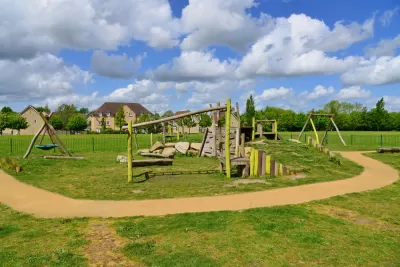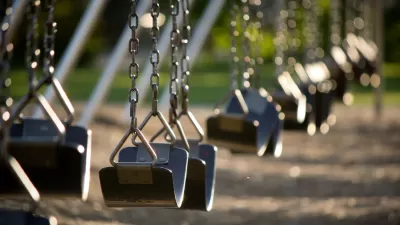A London organization is working to bring ‘adventure playgrounds’ to park-poor neighborhoods, arguing that outdoor play is a key factor in child development.

“In London, where over a fifth of households have no garden space and the city has an average of 866 children per playground, one charity social initiative is working to put play at the forefront of the urban agenda for building up communities in London’s low-income neighborhoods.” According to an article by Alia Waheed in NextCity, play advocates like Paul Hocker of London Play say that play is “essential for childhood development,” Waheed writes. “Ideally, safety and children’s freedom to play should be a key factor in city and town planning.”
To encourage more outdoor play, “London Play Design has a team of carpenters, engineers and play workers who build sustainable and creative adventure playgrounds in some of the most deprived areas of London.”
At its heart, adventure play is unstructured, outdoor play that encourages children to take controlled risks in supervised outdoor spaces that allow children to play freely. At London Play Design’s adventure playgrounds, children can use tools to build play structures, grow plants and care for animals under the watch of professional play workers.
The article continues, “The playgrounds are supervised by play workers who run arts and crafts sessions and homework clubs. The workers offer local low-income families an alternative to traditional models of child care, which are often prohibitively expensive, and give children the opportunity to develop skills and build support networks within their communities.”
Advocates say playgrounds are more than a luxury. “Inequality of access to outdoor play goes beyond just having somewhere to sit on the swings. It has ramifications on health, education and social outcomes for children from deprived backgrounds. In the long term, it also affects mortality rates.”
FULL STORY: Fighting for the Right to Play Outdoors

Planetizen Federal Action Tracker
A weekly monitor of how Trump’s orders and actions are impacting planners and planning in America.

Map: Where Senate Republicans Want to Sell Your Public Lands
For public land advocates, the Senate Republicans’ proposal to sell millions of acres of public land in the West is “the biggest fight of their careers.”

Restaurant Patios Were a Pandemic Win — Why Were They so Hard to Keep?
Social distancing requirements and changes in travel patterns prompted cities to pilot new uses for street and sidewalk space. Then it got complicated.

Platform Pilsner: Vancouver Transit Agency Releases... a Beer?
TransLink will receive a portion of every sale of the four-pack.

Toronto Weighs Cheaper Transit, Parking Hikes for Major Events
Special event rates would take effect during large festivals, sports games and concerts to ‘discourage driving, manage congestion and free up space for transit.”

Berlin to Consider Car-Free Zone Larger Than Manhattan
The area bound by the 22-mile Ringbahn would still allow 12 uses of a private automobile per year per person, and several other exemptions.
Urban Design for Planners 1: Software Tools
This six-course series explores essential urban design concepts using open source software and equips planners with the tools they need to participate fully in the urban design process.
Planning for Universal Design
Learn the tools for implementing Universal Design in planning regulations.
Heyer Gruel & Associates PA
JM Goldson LLC
Custer County Colorado
City of Camden Redevelopment Agency
City of Astoria
Transportation Research & Education Center (TREC) at Portland State University
Camden Redevelopment Agency
City of Claremont
Municipality of Princeton (NJ)





























